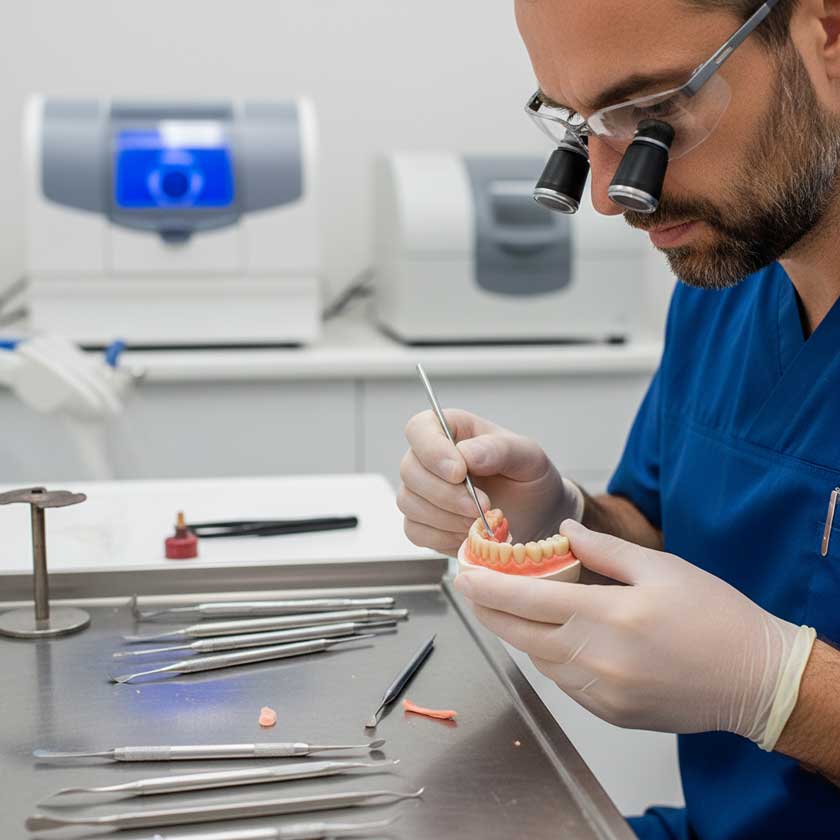Key Takeaways
- Clean dentures daily
- Brush tongue and gums
- Ensure a proper fit
- Remove dentures overnight
- Treat dry mouth

Understanding denture odors and halitosis.
Prevalence and concerns
Denture odors constitute a widespread issue, with approximately 87% of denture wearers identifying malodor as a significant concern (source). This issue extends beyond mere physical discomfort, often causing psychological distress and negatively impacting social interactions. Persistent bad breath can lead to embarrassment, reduced confidence, and social withdrawal for denture wearers.
Causes of denture odors
Denture odors typically result from bacterial growth, which occurs when dentures are not properly cleaned. Neglecting proper cleaning routines can lead to microbial accumulation, particularly when individuals sleep with their dentures in place overnight (source). Additionally, the lack of tongue brushing significantly contributes to halitosis, as bacteria can accumulate on the tongue’s surface (source).
Poorly fitting dentures are another major factor, as they often trap food particles, promoting bacterial growth and exacerbating odors (source). Furthermore, xerostomia (dry mouth) can intensify denture-related odors by reducing saliva production, which otherwise helps naturally cleanse the oral cavity and dentures (source).
Effective strategies to combat denture odors.
1. Proper and regular denture cleaning.
Maintaining a daily denture cleaning routine is crucial for combatting odors. Using a denture cleanser as part of your daily cleaning routine is recommended to effectively remove plaque, bacteria, and stains while ensuring the safety and durability of your dentures. Effective cleaning involves brushing dentures thoroughly and soaking them overnight to eliminate up to 99.9% of germs (source). After brushing, rinsing dentures under cold water after meals is important to remove food particles and bacteria, helping to maintain freshness and control odor. Selecting quality denture cleaning products specifically designed to remove bacteria helps ensure freshness and cleanliness.
2. Maintaining proper oral hygiene.
Even without natural teeth, regular oral hygiene remains essential. Flossing and using floss to clean between any remaining natural teeth is crucial for removing plaque and food particles that can cause bad breath and decay. Maintaining oral hygiene for all remaining teeth, including thorough brushing and flossing, helps prevent oral health issues and supports overall mouth health. Brushing the tongue and gums prevents the buildup of odor-causing bacteria (source). Additionally, using mouth rinses specifically formulated for denture wearers can further reduce bacteria and maintain fresh breath.
3. Ensuring appropriate denture fit.
Ill-fitting dentures can trap food particles and bacteria, leading to unpleasant odors. Regular check-ups and professional adjustments help ensure dentures fit properly, reducing the risk of odor-causing bacterial buildup (source). Denture relining and timely adjustments are proactive measures for maintaining oral freshness.
4. Overnight denture care
Sleeping with dentures significantly increases bacterial growth, worsening odors (source). Dentures need to stay moist overnight to maintain comfort and prevent damage. Removing dentures overnight and soaking them in specialized cleaning solutions effectively reduces germs, ensuring fresh-smelling dentures in the morning (source). Choosing effective products and following recommended overnight soaking practices are vital steps.
5. Combatting dry mouth (Xerostomia)
Dry mouth is closely associated with increased bad breath due to reduced saliva flow (source). Staying hydrated, using saliva substitutes, and avoiding medications or habits that exacerbate dry mouth can significantly reduce denture-related odors. Reducing or avoiding alcohol intake is also recommended, as alcohol can dehydrate the mouth and promote odor-causing bacteria, leading to dry mouth and bad breath. Addressing xerostomia directly supports overall oral hygiene and freshness.
Additional preventive measures
Using specialized denture adhesives
Using specialized denture adhesives can be an effective additional measure for preventing the buildup of food particles and bacteria around dentures. Denture adhesives help secure dentures more firmly, reducing gaps and spaces where food debris and bacteria could accumulate and cause odors (source).
When selecting a denture adhesive, look for products specifically designed to help prevent bad breath and bacterial growth. Opt for adhesives that provide a stronger hold to minimize movement and gaps. Proper application is crucial; apply adhesives sparingly and evenly, ensuring a thin layer is distributed across the denture surface. Always follow the manufacturer's guidelines for optimal results and proper care.
Dietary considerations
Diet plays an important role in managing denture odors and overall oral freshness. Avoiding certain foods can significantly reduce the risk of bad breath. Strong-smelling and pungent foods, such as garlic, onions, and heavily spiced dishes, can contribute to persistent odors.
Incorporating certain foods and beverages can help freshen breath naturally. Foods high in fiber, such as crunchy fruits and vegetables, stimulate saliva production, which helps rinse away bacteria and odor-causing particles. Drinking adequate amounts of water also keeps the mouth hydrated, reducing dry mouth-related odors. Additionally, consuming sugar-free chewing gum or mints can temporarily mask bad breath and stimulate saliva flow, further aiding oral freshness.
Denture maintenance tips
Maintaining your dentures properly is essential for preventing denture odor and bad breath, and for supporting overall oral health. To keep your dentures clean and fresh, make it a habit to clean your dentures daily, focusing on removing food particles and bacteria that can accumulate throughout the day. Use a non-abrasive denture cleaner and a soft-bristled toothbrush to gently brush all surfaces of your dentures, paying extra attention to areas where food debris tends to get trapped.
Soaking your dentures overnight in a denture cleaning solution is another key step. This helps to remove stubborn plaque and bacteria that brushing alone might miss, ensuring your dentures stay clean and odor-free. Regular dental checkups are also crucial for denture wearers. Your dentist can spot early signs of oral health issues such as gum disease or tooth decay, and provide expert guidance on proper denture care.
By following these denture maintenance tips—gently brushing with a soft-bristled toothbrush, using a non-abrasive denture cleaner, soaking your dentures overnight, and scheduling regular dental checkups—you can help prevent bad breath, keep your dentures clean and comfortable, and maintain good oral hygiene for a healthier, more confident smile.
Effective denture care routine
Establishing an effective denture care routine is vital for maintaining optimal hygiene and keeping denture odors at bay. Start by brushing your dentures at least twice a day with a soft-bristled toothbrush and mild soap to remove food particles and bacteria. After every meal, rinse your dentures thoroughly to wash away any lingering food debris and help prevent the buildup of odor-causing bacteria.
For a deeper clean, consider using an ultrasonic cleaning kit. This device uses gentle vibrations to dislodge stubborn plaque and bacteria from hard-to-reach areas, ensuring your dentures are thoroughly cleaned. Soak your dentures overnight in a denture cleaning solution to keep them fresh and free from persistent odors.
Don’t forget to care for your mouth as well—gently brush your gums and tongue to remove bacteria that can contribute to bad breath. Using an antibacterial mouthwash can further help to kill odor-causing bacteria and leave your breath feeling fresh. By following this effective denture care routine, you’ll keep your dentures clean, comfortable, and free from bad breath, while supporting good oral health and boosting your confidence every day.
Seeking professional advice and care
Regular dental checkups
Regular dental checkups play a crucial role in maintaining oral hygiene, particularly for denture wearers. Professional evaluations help identify potential issues early, allowing prompt intervention and prevention of complications. Dental professionals are essential in managing denture-related halitosis, as they assess denture fit, cleanliness, and overall oral health. According to Haleon HealthPartner, visiting dental care providers regularly ensures dentures fit properly, reducing the risk of bacteria accumulation and subsequent halitosis (haleonhealthpartner.com).
Identifying persistent problems
It’s important to recognize signs indicating the need for professional intervention. For example, if bad breath persists despite diligent cleaning and maintenance, it is a clear indication that professional assessment is needed. Other indicators include discomfort or soreness from dentures, ill-fitting dentures, or visible signs of wear and tear. Dental professionals can offer customized treatment options such as denture relining, replacement, or specialized cleaning procedures. As noted by Registered Dental Hygienists Magazine, proper professional care helps eliminate the germs responsible for malodor, significantly improving oral health and comfort (rdhmag.com).
Conclusion
Maintaining fresh breath and oral hygiene as a denture wearer requires consistent and proactive care. Effective strategies include regular and thorough cleaning of dentures, overnight soaking to eliminate germs, and ensuring dentures fit properly to prevent bacteria buildup and odor (rdhmag.com, haleonhealthpartner.com). Additionally, brushing the tongue and removing dentures overnight can significantly reduce the risk of halitosis (pubmed.ncbi.nlm.nih.gov).
Proactive measures such as addressing dry mouth, using appropriate denture adhesives, and regularly consulting dental professionals can further enhance comfort and freshness (absolutedental.com, polident.com). By consistently adopting these practices and seeking professional guidance, denture wearers can improve their quality of life and enjoy more confident smiles. By consistently adopting these practices and seeking professional guidance, denture wearers can effectively combat odors and maintain lasting oral health.







